

Is Universal Basic Income a Solution to Tech Unemployment? What's Wrong With Bill Gates' Robot Tax - Bloomberg View. Microsoft Corp. founder Bill Gates made a splash in a recent interview, when he suggested that robots should be taxed in order to help humans keep their jobs: Right now, the human worker who does, say, $50,000 worth of work in a factory, that income is taxed and you get income tax, social security tax, all those things.
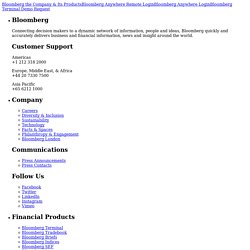
If a robot comes in to do the same thing, you’d think that we’d tax the robot at a similar level. Gates is only one of many people in the tech world who have worried about automation and its threat to workers. YCombinator founder Sam Altman, for instance, is conducting an experiment with basic income -- a regular cash payment to all households. That policy has gained popularity across Silicon Valley, if not in the rest of the country. Views from Those Who Expect AI and Robotics to Displace More Jobs than They Create by 2025.
On the other hand, 48% of our survey respondents agree with the statement that “networked, automated, artificial intelligence applications and robotic devices [will] have displaced more jobs than they have created by 2025.”
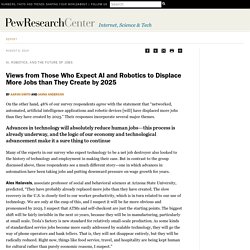
Their responses incorporate several major themes. Advances in technology will absolutely reduce human jobs—this process is already underway, and the logic of our economy and technological advancement make it a sure thing to continue. The future of work: Blessed are the cheesemakers. The Wealth of Humans: Work and its Absence in the Twenty-first Century.

By Ryan Avent. St Martin’s Press; 288 pages, $26.99. Allen Lane; £25 MIDWAY through Ryan Avent’s “The Wealth of Humans”, I found myself marking “H” in the margin, to stand for heresy, so thick and fast do the counterintuitive insights arrive. Here are some. The future of work: Blessed are the cheesemakers. More welfare or more weekend? On a Universal Basic Income, full employment and avoiding libertarian traps It's the summer of 1986.

Top Gun and Glasnost and the depths of a renewed Cold War—a war the Eastern Bloc is losing. Reagan is in the middle of his second term. Thatcher is set to win her third in just under a year. Log In - New York Times. “We are!”
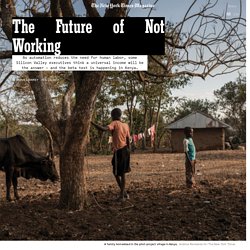
They cried in unison. Then he laid out the particulars. “Every registered person will receive 2,280 shillings” — about $22 — “each and every month. You hear me?” The audience gasped and burst into wild applause. Basic Income - Dr. Kevin Milligan-160518 - Canadian Association for Business Economics. Basic Income - Dr.
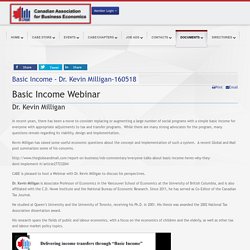
Kevin Milligan-160518 Dr. A Tale of Two Moralities, Part One: Regional Inequality and Moral Polarization - Niskanen Center. January 19, 2017 by Will Wilkinson The United States is not very united.

Americans have been sorting themselves along ideological lines into like-minded regions of the country, increasing polarization in congressional voting patterns, and creating a striking division in political preference and party loyalty between city-dwellers and the denizens of low-density exurban and rural counties. The changing geography of US poverty. Chairman Smith, Ranking Member Davis, and members of the Subcommittee, thank you for the invitation to appear before you today.

In my testimony, I will provide information on the changing geography of poverty in the United States (including the rapid rise of poverty outside of urban and rural communities in recent years), key factors that have driven these shifts as well as challenges raised by them, and implications for efforts to effectively address poverty and promote opportunity across different kinds of communities.
While these issues have been the subject of my research at the Brookings Institution’s Metropolitan Policy Program, the views expressed in this testimony are my own. The Brookings Institution does not take institutional positions on policy issues. How inclusionary zoning stands to grow affordable housing in Ontario. On December 6, 2016, the Ontario legislature passed the Promoting Affordable Housing Act, 2016, expanding the powers of Ontario municipalities to implement "inclusionary zoning," a requirement for developers to build affordable units when constructing new market‑rate housing.

The Act changes the provincial Planning Act, RSO 1990, c.P.13, by obliging some municipalities, while making it optional for others, to adopt inclusionary zoning policies. A discussion on the adoption of the Act and debates surrounding its inclusionary zoning provisions can be found on our firm's blog. These legislative changes come years after rising housing prices, lagging income levels and dwindling federal and provincial funding have created an increasing need for new affordable housing in Ontario. Rabble.ca. UBS – the sustainable social safety system for the 21st century. Basic income? How about basic services? By Armine Yalnizyan Tues., July 19, 2016 On June 24, news of Brexit overshadowed a development with far greater potential to change your future: Ontario announced that the Honourable Hugh Segal would prepare a discussion paper on constructing a basic income pilot program for the province, launching the most significant opportunity to talk about the country we want to create since the 1970s.
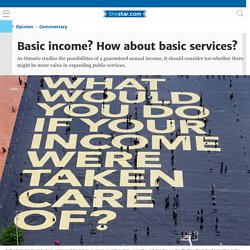
I am excited about the possibilities, and hopeful the discussion will put basic income in a more realistic context: not as an all-encompassing fix, but as one half of an approach that could help us adapt to the emerging realities of the early 21st century. No time like the present to tackle the future of work and income. A growing number of individuals and organizations — from philanthropists to tech companies to think tanks to governments — are asking how emerging technologies will impact the global workforce. Artificial intelligence and greater automation will displace many employees and create opportunities for others, with new and different skills.
But in the short term, automation is more likely to transform work rather than eliminate jobs, according to a recent report by the McKinsey Global Institute. That cushion offers the time and space for the public and private sectors to consider how to make this transition as inclusive as possible, Chor Pharn Lee of the Center for Strategic Futures in Singapore said at an event in San Francisco last week hosted by Next Era, an initiative of two Finnish think tanks.
Financial Security Should Be the Next Human Right. Subscribe to read. Workers in a World of Continuous Partial Employment. Our future workplaces are increasingly managed by apps and algorithms. Is technology empowering workers, or making them ever more helpless cogs in a corporate profit machine? When we talk about the “on-demand economy”, we are really talking about two things: the ability of a consumer to summon a vehicle, their lunch, or their groceries with the touch of an app or a few words to Siri, Cortana, or Google Now; and the lives of the workers who respond to those summons. Instant on-demand consumer services mean workers must also be available on demand. As Logan Green of Lyft noted, his company provides “transportation as a service.” Perhaps the more general point is that it provides labor as a service. How the Welfare State Can Survive the Robot Revolution. As advanced economies become more automated and digitized, almost all workers will be affected, but some more than others.
Those who have what the economists Maarten Goos and Alan Manning call “lovely jobs” will do fine, creating and managing robots and various digital applications and adding lots of value in service sectors such as finance. Those who have what Goos and Manning call “lousy jobs,” however—in sectors such as manufacturing, retail, delivery, or routine office work—will fare less well, facing low pay, short contracts, precarious employment, and outright job loss.
Economic inequality across society as a whole is likely to grow, along with demands for increased state expenditures on social services of various kinds—just as the resources to cover such expenditures are dropping because of lower tax contributions from a smaller work force. These trends will create a crisis for modern welfare states, the finances of which will increasingly become unsustainable.